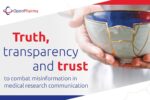This week, we explore how shortform science videos might be compromising our critical thinking. We read about how copyright regulations are changing with AI, and whether an AI jury could help improve research quality. We delve into the facts and myths about strains on publishing and read Amélie Godefroidt’s interview with COS on trust, transparency and open science. We learn of a tool built to help fight misinformation and highlight a call to action for continued commitment to the UN’s Sustainable Development Goals. Finally, we signpost the NIH’s announcement to cap publisher fees for publicly funded research.
To read:
Are simplified science videos making us less critical? via The British Psychological Society | 4-minute read
With the rise of social media platforms such as TikTok, Instagram and YouTube, we have unprecedented access to understandable, engaging science and medical information. But can plain language and simplified science videos make us overconfident of our critical thinking abilities? In this study published in Frontiers in Psychology, researchers from the University of Cologne explore if the easiness effect – a bias that can lead us to overestimate our competencies – occurs with such video formats, and whether a debiasing intervention can influence outcomes.
Copyright in the age of AI via LinkedIn | 8-minute read
In the new age of AI, more creative and comprehensive defences must be put in place to protect content from copyright. In Copywrong and the content copyright conundrum in an age of genAI, Andrew Shepherd (Scientific Director at Envision Pharma Group) describes how artificial intelligence (AI) crawlers can deprive content creators of revenue and increase costs for hosts. Dr Shepherd also explains current regulatory shortcomings, discusses strategies to protect content – such as data poisoning tools or systems that trap and waste the resources of AI crawlers, like Cloudflare’s AI Labyrinth – and shares his insights regarding the path forward.
Can an AI jury improve the quality of research? via Elsevier | 10-minute read.
“We’re democratizing access and making millions of documents, articles, books and chemical substances available to all researchers”, states Christian Druckenbrodt (Manager of Data Quality Standards and Informatics at Elsevier). Dr Druckenbrodt and his team at Elsevier have devised a method that uses large language models (LLMs) to evaluate the outputs of other LLMs for relevance and accuracy, flagging inappropriate prompts and biases. If models disagree, human experts act as tiebreakers. Read the full article to learn the challenges of the jury system and why “data is still king”.
Facts and myths about the strain on publishing via LSE | 6-minute read
Between 2003 to 2023, citable research grew by nearly 200%, with researchers in Asia now contributing approximately 40% of all citable documents. However, this global diversification is not represented across editorial boards or peer reviewers, which could be a cause of strain on publishing. This article authored by Ritu Dhand (Chief Scientific Officer of Springer Nature) emphasizes the need to redefine impact and quality of research beyond citation metrics, and it calls to diversify our editorial teams and truly globalize peer review.
Trust, transparency and open science: an interview with Amélie Godefroidt via COS | 10- minute read
In an interview with the Center for Open Science (COS), Amélie Godefroidt (Postdoctoral Researcher and Lecturer at KU Leuven) discusses the benefits of using the Open Science Framework (OSF) and how adopting open science can rebuild trust and collaboration within the scientific community and beyond. The Q&A explores the focus of Dr Godefroidt’s research as well as her inspiration for creating the Open Science in the Social Sciences course, which has been made publicly available on OSF. She hopes to partner with Framework for Open and Reproducible Research Training (FORRT) to explore ways of making the course more accessible and visible.
The tool that is fighting misinformation via Canadian Medical Association | 8-minutes
The spread of misinformation can directly impact patient care. Given the sheer volume of health-related content posted on social media, combatting misinformation patterns before they escalate remains a significant challenge. To address this, researchers at the University of Waterloo developed the UbiLab Misinformation Analysis System (U-MAS) – a tool that was initially used to evaluate claims about the Russia–Ukraine war but now also targets vaccine hesitancy and myths around fluoride, heatwaves and diet. Read the full article to explore how tools like U-MAS can help inform policies and combat false messaging.
A continued commitment to UN’s SDGs via The Scholarly Kitchen | 5-minute read
As global attention risks shifting away from long-term sustainability efforts, it is important that we reaffirm our commitment to the United Nations’ Sustainable Development Goals (SDGs). To support these goals, the International Association of Scientific, Technical & Medical Publishers (STM) has launched a level 3 framework based on “concrete examples where we moved a specific SDG target”, as part of their SDG roadmap launched in 2023. In this call to action, Rachel Martin (Global Director of Sustainability at Elsevier) discusses the hope to gather real-world examples of publishers supporting and advancing the SDGs and reminds us why working collectively is important for tangible impact.
NIH announces plans to cap publisher fees via STM Publishing News | 5-minute read
To promote scientific transparency and restore trust in public health, the National Institutes of Health (NIH) announced plans to cap the fees publishers can charge NIH-supported researchers to make results from their research publicly accessible in 2026. “This reform will make science accessible not only to the public but also to the broader scientific community”, said Jay Bhattacharya (Director of NIH).
Enjoy our content? Read last week’s digest and check out our latest quarterly update!
Don’t forget to follow us on Bluesky and LinkedIn for regular updates!






